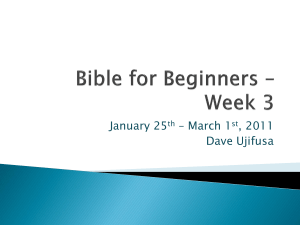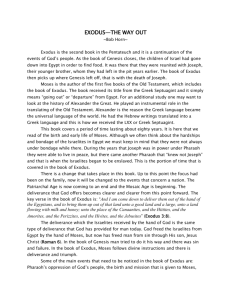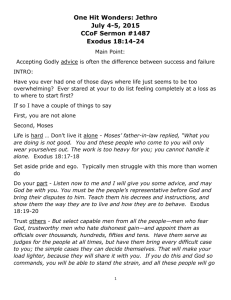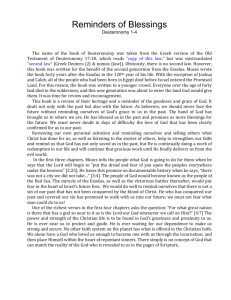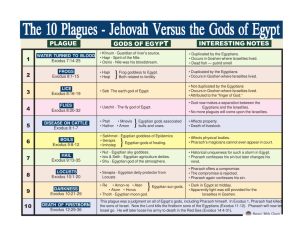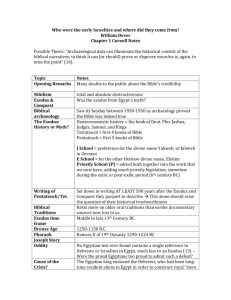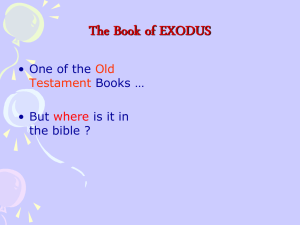EXODUS
advertisement
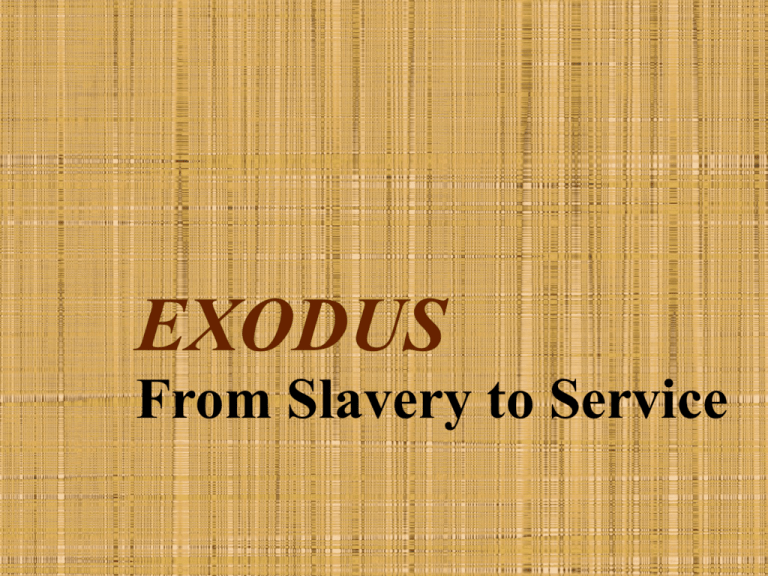
EXODUS From Slavery to Service 2. Preparing the Way The Women Who Save Moses (Exodus 1:15–2:10) References • Exodus (from series Interpretation: A Bible Commentary for Teaching and Preaching) Terence E. Fretheim, Westminister / John Knox Press, 1991 • From Slavery to Service: A Study of Exodus, by Diane L. Jacobson, Augsburg Fortress, Minneapolis, 1996 ISBN 0-8066-2978-9 (out of print) • “The Book of Exodus. Introduction, Commentary, and Reflections.” Walter Brueggemann. In: The New Interpreter's Bible, A Commentary in Twelve Volumes, Volume I. Abingdon Press, Nashville, 1994. ISBN 0-687-27814-7 • The Book of Exodus, by Brevard S. Childs, Westminster, 1974 Exodus 1:15-17 15 The king of Egypt said to the Hebrew midwives, one of whom was named Shiphrah and the other Puah, 16‘When you act as midwives to the Hebrew women, and see them on the birthstool, if it is a boy, kill him; but if it is a girl, she shall live.’ 17But the midwives feared God; they did not do as the king of Egypt commanded them, but they let the boys live. (NRSV) Exodus 1:15-17 Notes • Shiphard and Puah • Why mention their names? • Head officials of the guild (C) • Part of the poetic character of the narrative: they are more important in the eyes of God than the mighty, but unnamed Pharaoh (J) • Were they “Hebrew midwives,” or “midwives of the Hebrews” (and hence possibly Egyptian)? • Hebrew: Massoretic text accepted former. Names are Semitic. Puah: “splendid one” or “girl”. Shiphrah: “fair one” (present on list of Egyptian slaves) (C) Exodus 1:15-17 Notes • Egyptian: Pharaoh would not have trusted Hebrew women to kill their own ken. Narrator says they “feared God” as if “fearing God” would be a surprise (C) • “Hebrew” (rather than Israelites) • Refers to any group of marginal people who have no social standing: the hapiru of nonbiblical texts (B) Exodus 1:15-17 Notes • “fear of God” (= trust in God) • Prominent theme in wisdom literature (Prov 2:5-15) • Those who feared God were the wise who discerned the fundamental order in creation, and brought their lives into harmony with it (F) • Pharaoh here is the “angel of death”; “midwives’ ethic of defenseless resistance rooted in an understanding of God’s creative work” (F) Exodus 1:15-17 Notes • Ironies: (F) • Midwives, who deal with the beginning of life, are asked to become dealers of death • Pharaoh does not seem to understand that killing Hebrew males will deplete his slavelabor force • Those that Pharaoh saves – the daughters – are the ones who undermine his policy Exodus 1:18-19 18So the king of Egypt summoned the midwives and said to them, ‘Why have you done this, and allowed the boys to live?’ 19The midwives said to Pharaoh, ‘Because the Hebrew women are not like the Egyptian women; for they are vigorous and give birth before the midwife comes to them.’ (NRSV) Exodus 1:18-19 Notes • Midwives’ bold and clever response to Pharaoh: • Put-down of the King’s subjects (F) • Testimony the surging power for life in the Hebrew women (hayot, “vigorous”) (F,B) • Ends the conversation: high-lights the stupidity of the king (C, F) • Why have an office of Hebrew midwives in the first place if the women did not need them? Exodus 1:18-19 Notes • Modern readers not usually troubled by midwives’ lie • Augustine: lying never justified • Calvin: midwives’ behavior “reprehensible and displeasing to God” • Jacobson: “The association of the women with life and God’s reaction to their behavior would tilt the balance toward approving their behavior, though it is interesting that people of different eras come to such different conclusions” Exodus 1:20-21 20So God dealt well with the midwives; and the people multiplied and became very strong. 21And because the midwives feared God, he gave them families. Exodus 1:20-21 Notes • God’s dealing with the midwives connected with the growth of the people: God’s creational work accomplished in and through them (F) • Fear of God brings blessing (F) • E.g. Deuteronomy 6:24 “The LORD commanded us to observe all these statutes, to fear the LORD our God, for our lasting good, so as to keep us alive…” (NRSV) Exodus 1:22 22Then Pharaoh commanded all his people, ‘Every boy that is born to the Hebrews you shall throw into the Nile, but you shall let every girl live.’ (NRSV) Exodus 1:22 • Pharaoh decrees the genocide of the Hebrews • Clearly irrational to kill off the core of your labor force: suggests fear and rage have produced a deep insanity in imperial policy (B) • Future shaped in part by human action: “God too awaits a future where human activity, both negative and positive, will have an effect on God’s own possibilities” (F) Exodus 2:1-2 1Now a man from the house of Levi went and married a Levite woman. 2The woman conceived and bore a son; and when she saw that he was a fine baby, she hid him three months. (NRSV) Exodus 2:1-2 Notes • Parents an unnamed Levi man and woman • Establishes Moses’ credentials: Levis will later be the priestly tribe (F) • “fine” baby • Hebrew tov. Can mean “beautiful,” “appealing,” “healthy,” or “well-behaved.” (J) • Same Hebrew word used to describe God’s view of Creation (it was “good”), thus evoking Genesis (F) Exodus 2:3-4 3When she could hide him no longer she got a papyrus basket for him, and plastered it with bitumen and pitch; she put the child in it and placed it among the reeds on the bank of the river. 4His sister stood at a distance, to see what would happen to him. (NRSV) Exodus 2:3-4 Notes • Great care is taken to prevent leaks (C) • Even had a top • Sister “stood at a distance, to see what would happen to him” • Hebrew idiom here implies much more than just passive or neutral observation (C) • Hebrew word for basket (teba) same as that used for Noah’s ark (F, B) • The new “ark” floats in the watery chaos like Noah’s ark: the parallel suggests the saving of Moses of cosmic significance Exodus 2:3-4 Notes • The Ark-Basket placed in the reeds (sup) at the edge of the Nile • Word for “reeds” subsequently used to describe the waters through which Israel comes to liberation in Exodus 13:18. “Baby is at the edge of the waters of freedom, there before his people” (B) • We will not learn the names of Moses’ mother (Jochebad) and sister (Miriam) until Exodus 7:20 and 15:20 (J) Exodus 2:5-6 5The daughter of Pharaoh came down to bathe at the river, while her attendants walked beside the river. She saw the basket among the reeds and sent her maid to bring it. 6When she opened it, she saw the child. He was crying, and she took pity on him, ‘This must be one of the Hebrews’ children,’ she said. (NRSV) Exodus 2:5-6 Notes • Pharaoh’s daughter immediately recognizes baby as a Hebrew • She “has pity” (NRSV) or “felt sorry” (NIV) (hamal). Hebrew word conveys a stronger reaction than either of these translations (B) • Ironies: (F) • Pharaoh’s chosen instrument of destruction (the Nile) is the means for saving Moses • Member of Pharaoh’s own household thwarts his policy Exodus 2:7-9 7Then his sister said to Pharaoh’s daughter, ‘Shall I go and get you a nurse from the Hebrew women to nurse the child for you?’ 8Pharaoh’s daughter said to her, ‘Yes.’ So the girl went and called the child’s mother. 9Pharaoh’s daughter said to her, ‘Take this child and nurse it for me, and I will give you your wages.’ So the woman took the child and nursed it. (NRSV) Exodus 2:7-9 Notes • Sister takes the initiative and speaks to the Pharaoh’s daughter • Ironies: (F) • Egyptian royalty heeds a Hebrew’s girl’s advice! • Mother gets paid to do what she wants to do Exodus 2:10 10When the child grew up, she brought him to Pharaoh’s daughter, and she took him as her son. She named him Moses, ‘because,’ she said, ‘I drew him out of the water.’ (NRSV) Exodus 2:10 Notes • Moses is an Egyptian name • Comes from root of Egyptian word for “beget;” means “son” (J) • e.g. Egyptian Pharaoh Tutmoses = “son of Tut” or “begotten of Tut” • Hebrew writer apparently unaware of this (or likely would have used the information). Connects name with similar sounding Hebrew word for “to draw out” (C) • Normally, naming of a child occurs at birth • Moses first person named in Exodus 2 Baby in the Basket narrative Exodus 1:15 – 2:10 Themes Exodus 1:15 – 2:10 Themes • Defenseless Resistance or Civil Disobedience • Seen in: • Midwives’ defiance of Pharaoh’s order out of “fear” of God • Mother trying to save Moses, hiding him for 3 months; then strategically placing him in the ArkBasket • Rooted in a creation theology. Preservation of life takes priority over the edicts of any human person Exodus 1:15 – 2:10 Themes • The importance of the activity of women in the divine economy • The five women in these stories play crucial roles: Israel’s future dependent on their wisdom, compassion, and courage • God is able to work in and through them to achieve God’s purposes Exodus 1:15 – 2:10 Themes • The effectiveness of the service given by lesser known members of society • “God is able to use persons of faith from even lowly stations in life to carry out the divine purpose. Moreover, there is no indication … that this courageous activity ever becomes public… But the deeds of these women are made known somehow, and their names remembered, while the king of Egypt in all of his pomp and splendor remains forever nameless.” Exodus 1:15 – 2:10 Themes • God uses the weak, what is low and despised in the world to shame the strong (see Jer 9:23; I Cor 1:26-29) • God works through persons who have no obvious power Exodus 1:15 – 2:10 Themes • God uses the gifts of non-believers for God’s creative and redemptive purposes • “Basic human values such as compassion, justice and courage, as well as the active subversion of cruel and inhumane polices are seen to be present among God’s creatures quite apart from their relationship to Israel; such are the product of God’s activity in creation.” (F, p39) Exodus 1:15 – 2:10 Themes • God’s divine activity is often unobtrusive • God works in and through human beings to preserve Moses • The human activity is genuine: if they were to fail, “God would have had to find a different way into the future with the possibilities then available” Exodus 1:15 – 2:10 Themes • Birth of Moses parallels Matthew’s story of the Birth of Jesus • Cruelty of Pharaoh / Herod • Holy Innocents killed by Pharaoh / Herod • “The Old Testament story is… indispensable in providing the proper interpretation of what God is doing in Jesus”
